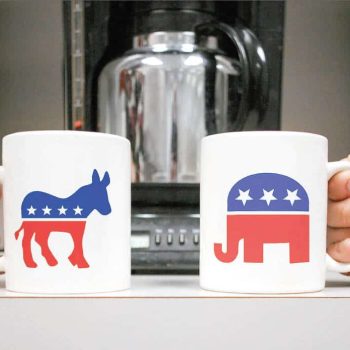In an article entitled “Bitter Presidential Race Breeds Workplace Tensions,” the Wall Street Journal recently addressed how the recent presidential election has impacted U.S. workplaces. In one of the most heated and talked-about presidential elections in recent memory, it seems natural there would be workplace “water-cooler” talk about the election. American workers are well aware of their First Amendment right to freedom of speech, but do these rights extend to the workplace? What are the employer’s obligations and employee rights regarding discussions about politics at work?
Here are seven questions and answers that may help non-profit 501(c)(3) organizations and for-profit employers navigate the treacherous waters of “politics in the workplace.” Many of the answers to these questions will be governed by state law.
- Do employees have a First Amendment right to express their political views in the workplace?
Answer: No. While private citizens may exercise their First Amendment right to free speech about their political views outside of the workplace, a First Amendment right does not extend to private-sector employees in the workplace. A narrow exception to this exists where an employee’s speech concerning a political candidate has a “nexus” to the employee’s terms and conditions of employment (see below).
- May an employer impose an absolute ban on any employee discussions of politics in the workplace?
Answer: Employers should be careful not to impose absolute bans on employee speech about support of positions of political candidates. Under the federal National Labor Relations Act (NLRA), covered employees have a legal right to discuss terms and conditions of employment like wages and workplace health and safety. If there is a “direct nexus between the specific issue that is the subject of the advocacy and a specifically identified employment concern of the participating employees,” then the employee’s political speech may be protected by the NLRA. Even where the “direct nexus” exists, however, the employee’s advocacy is protected only when it is non-disruptive and occurs on the employee’s non-working time in non-work areas.
If, for instance, an employee supports a certain political candidate because the candidate’s platform supports an increase in the minimum wage or improved workplace safety regulations, that speech would likely be viewed as protected speech by the National Labor Relations Board (NLRB) which enforces NLRA. However, employers may have solicitation policies limiting employee solicitations, including soliciting for political campaigns—whether by email, social media or otherwise– to non-working time. They may also limit distributions of materials, including campaign materials, to non-working areas. As noted below, 501(c)(3) organizations should prohibit employees from using the organization’s resources or equipment for purposes of endorsing or supporting a political campaign.
3. May an employer recommend certain politicians to its employees or tell its employees that if they vote for a particular political candidate, the organization will suffer and they will likely lose their jobs?
Answer: In an earlier Perlman & Perlman blog entitled “Political Activity and Nonprofits – 501(c)(3)s Beware,” our firm addressed restrictions on political activities of 501(c)(3) organizations. As noted there, federal laws prohibit 501(c)(3) not-for-profit organizations from endorsing or opposing a political candidate.
With respect to for-profit employers, the answer depends. There is no federal election law that currently prohibits employers from using corporate funds to endorse and campaign for political candidates, or that prevents employers from telling their employees that they “could lose their jobs if they vote for a certain candidate.” A number of States, like Pennsylvania and New Jersey, however, among others, make it unlawful to threaten or intimidate employees to influence their political opinions or actions, including prohibiting employers from displaying any notice within 90 days before an election threatening to reduce compensation or conduct layoffs depending on election results. In addition, State laws protecting an employee from discrimination based on political affiliation or activity may be implicated. Employers should be aware of State laws governing these issues and potential issues under the federal National Labor Relations Act relating to workers’ rights to unionize.
4. May an employer prohibit certain employees from contributing to certain political campaigns or politicians?
Answer: It depends. In an earlier Perlman & Perlman blog entitled “Political Activity and Nonprofits – 501(c)(3)s Beware,” we addressed restrictions on political activities of 501(c)(3) organizations. As noted there, federal and state laws prohibit 501(c)(3) not-for-profit organizations from engaging in political activity, including making campaign contributions, endorsing or opposing a candidate—implicitly or explicitly, but that prohibition may or may not extend to private citizens, outside the workplace. As was also noted in that blog, employees at 501(c) (3) non-profit organizations are not prohibited by federal law from privately contributing to or participating in political campaigns so long as their actions and statements are not attributable to the 501(c)(3) organization.
Additionally, certainly 501(c)(3) organizations may forbid their Executive Director, high-level executives or anyone who could be perceived as speaking for the organization, from endorsing or expressing their views publicly (or even internally at workplace meetings) about a particular political candidate or campaign. It should also prohibit all employees from contributing money, time or use of the organization’s facilities or resources to making calls or emailing on behalf of a candidate or campaign. Or conversely, they should expressly direct those individuals not to do so.
Certain private-sector, for-profit employers with “pay-to-play” prohibitions may, in fact, restrict certain levels of employees from contributing to certain political campaigns or politicians. For instance, you may have heard that one major global financial institution has prohibited its partners from contributing to: “Any federal candidate who is a sitting state or local official (e.g., governor running for president or vice president, such as the Trump/Pence ticket, or mayor running for Congress), including their Political Action Committees (PACs).” The stated purpose of this prohibition is “to prevent inadvertently violating pay-to-play rules, particularly the look-back provision, when partners transition into roles covered by these rules.” It is “also meant to minimize potential reputational damage caused by any false perception that the firm is attempting to circumvent pay-to-play rules, particularly given partners’ seniority and visibility.” On the flip side, for-profit corporations may ask their “executive and administrative” employees and their family members, and stockholders and family member, to voluntarily contribute to a company’s political action committee. However, those corporations may not condition compensation, promotion or other employment benefits or detriment on such contributions. The Federal Election Commission regulations state that a corporation cannot facilitate the making of federal contributions by means of “coercion, such as the threat of a detrimental job action, threat of any other financial reprisal, or the threat of force, to urge any individual to make a contribution or engage in fundraising activities on behalf of a candidate or political committee.” As noted above, a number of States also prohibit employers from threatening or coercing employees to influence political action.
- May an employer prevent an employee from campaigning for a particular politician or political party at the workplace?
Answer: With respect to 501(c)(3) non-profit organizations, they may not use or allow the use of their resources for political activity, including, but not limited to, the use of work telephones, copy machines for making fliers, faxes or emails. For-profit employers may prohibit employees from campaigning for a particular politician or political party at the workplace subject to the caveats mentioned above.
- May an employer fire an employee for campaigning for a politician outside of work if the employer feels strongly opposed to that candidate?
Answer: State laws vary concerning whether employers may discriminate against employees on the basis of political campaigning or fundraising. For instance, New York Labor Law prohibits discrimination against employees on the basis of off-duty political activities, such as campaigning or fundraising, outside of working hours, off of the employer’s premises and without use of the employer’s property or equipment. There is an exception where the off-duty political activity creates a material conflict of interest with the employer’s trade secrets, proprietary information or other proprietary or business interests.
- What if an employee expresses to co-workers that he/she supports a particular political candidate because the candidate wants to close the U.S. border to Mexicans, ban Muslims, and does not believe married women should work outside the home? Must an employer allow an employee’s expression of support for a political candidate in the workplace?
Answer: Employers should be mindful that employee speech or conduct, that disparages or supports the disparagement of a person because of their legally protected status (i.e., gender, marital status, race, national origin, religion, disability, etc.), may violate an employer’s anti-harassment policy. Employers need not tolerate any remarks or conduct that would violate their anti-harassment policies or other workplace conduct policies. Typically, an organization’s anti-harassment policies apply to the organization’s electronic communications and social media policies as well.
Recommendations
- Ensure policies and procedures regarding politics in the workplace (and time-off-to-vote in States that require it) are current.
- Ensure managers are trained on organization policies around discussing politics in the workplace and voting leave rights under State law.
- Ensure that your organization has posted mandatory postings regarding time off to vote; and that your organization’s policies and practices adhere to the legal requirements of the applicable States.
- Employers would be well-advised to confer with their employment counsel regarding the particular facts regarding their employees’ political discussions in the workplace and applicable State laws to ensure compliance and avoid penalties.
- Perlman & Perlmanhttps://perlmanandperlman.com/author/nancyisrael/
- Perlman & Perlmanhttps://perlmanandperlman.com/author/nancyisrael/
- Perlman & Perlmanhttps://perlmanandperlman.com/author/nancyisrael/
- Perlman & Perlmanhttps://perlmanandperlman.com/author/nancyisrael/











